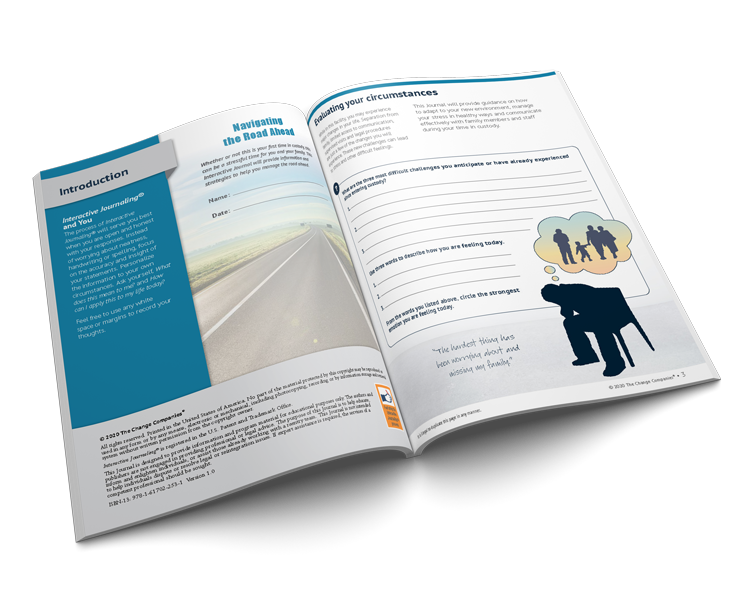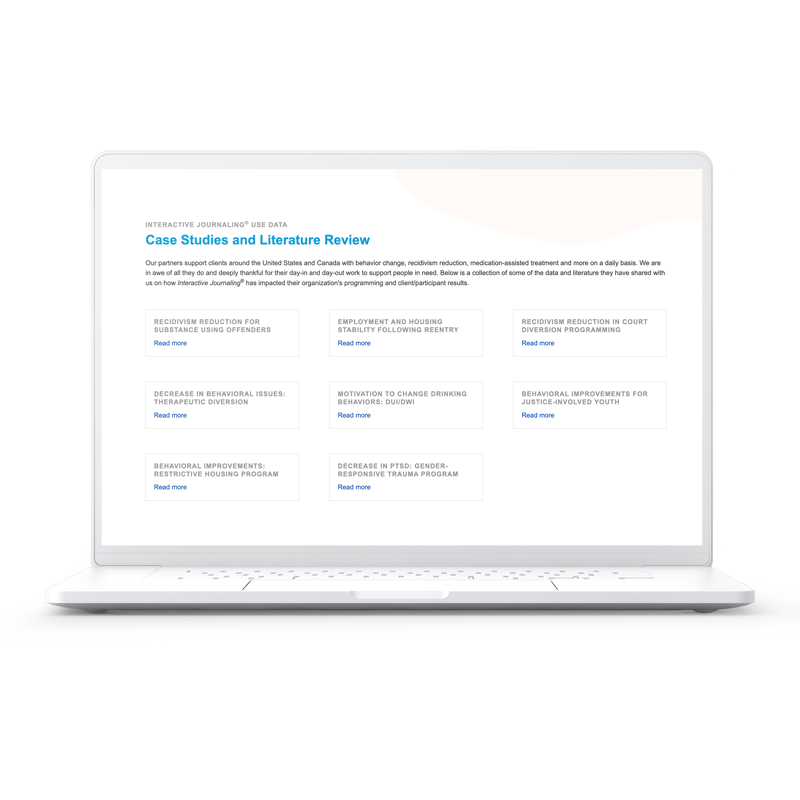
EVIDENCE-BASED SOLUTIONS
Prisons
The Change Companies partners with the Federal Bureau of Prisons and state departments of corrections to deliver evidence-based recidivism reduction programs that align with the most common risk-need domains. Prison-based curriculum topics include victim impact, anger management, substance use treatment, cognitive-behavioral skill acquisition, life skills, employment skills, reentry and gender-specific programming.
At The Change Companies, we put the tools for change directly into the hands of clients and equip staff with tools for person-centered care in one convenient platform. Select from a variety of curricula built upon the evidence-based practice of Interactive Journaling® to create your customized solution.
In addition to evidence-based curricula, our core solution includes access to the Fidelity Platform and live training for staff to ensure your organization is implementing best practices and gaining relevant skills for effective, person-centered treatment.
QUICK NAVIGATION
This page provides an end-to-end solution for prison professionals that includes curriculum, training and additional clinical resources.
| Risk-Need-Responsive Curriculum Interventions | |
| Staff Training and Skill Building | |
| Case Studies | |
| Digital Curriculum (Atlas) |
Solution Benefits
NO. 1
Measurable impact on site safety incidents, prosocial behavior and recidivism
NO. 4
Improved staff well-being, driving retention and immediate taxpayer ROI
NO. 2
Risk-Need-Responsive: Compatible with most RNR models
NO. 5
Comprehensive: Address a full range of behavioral health needs at various stages of sentence period
NO. 3
System-wide consistency in programming
NO. 6
Accessible: Curriculum materials are suitable for lower-literacy populations; Spanish language versions available
“This has been a great tool for me, because it opened new ways of checking myself before I end up acting out my criminal activities.” Interactive Journaling® inmate participant
“Changing a lifetime of drugs and crime is not an easy job. This program forced me to recognize that it was all up to me. I am responsible for where I am and I’m responsible for who I will become.” Interactive Journaling® inmate participant
“Results across diverse states and populations reveal that The Change Companies’ curricula are associated with statistically significant reductions in recidivism among program participants.” Denise Ernst, PhD
This gives guys (justice-involved persons) an opportunity to see that they are just like everyone else. They have strengths and they have shortcomings that they can work on, individually and collectively. Lance Reynolds, El Reno Federal Prison drug treatment specialist
EXPLORE CURRICULA
Risk-Need-Responsive Curriculum Interventions
Browse curricula in our online store →
Below are our recommended curricula for prisons. These curricula incorporate the evidence-based practice of Interactive Journaling® and help you create a person-centered program design.

Orientation to detention
The Navigating the Road Ahead Journal provides strategies for adapting to a new environment, dealing with change, managing stress, communicating effectively and identifying solutions.
Change readiness
The Preparing for Change Journal features information and activities designed to help participants look closely at their current situation and consider changes they may want to make.
Adjusting to incarceration
The BRAVE curriculum is designed to increase prosocial behavior for individuals early in their sentences. Curriculum topics include understanding thinking, living a prosocial lifestyle, strengthening relationships and strategies for success.
Justice-involved veterans
The Change Companies offers job readiness and reentry curricula for justice-involved veterans: women's curricula, men's curricula and career exploration. These curricula incorporate video content featuring advice and motivation from formerly incarcerated veterans.
Faith-based reentry programming
The Threshold Program helps participants follow a pathway that strengthens their spiritual understanding and growth. It encourages participants to address major life issues from the perspective of their own religious traditions.
Sex offender programming
Preparing to Change is a preparatory treatment program for convicted sex offenders and serves as a gateway to other sex offender management and treatment programming.
Women's Risk Needs Assessment (WRNA)
The Women’s Risk Needs Assessment (WRNA) represents the only suite of peer-reviewed risk/need instruments designed by and for system-impacted women. The WRNA helps staff, and the women they supervise, identify clients’ criminogenic needs while better understanding their strengths. The instrument facilitates case planning to appropriate gender-responsive programs to address women’s specific needs, which is crucial to reducing women’s recidivism and improving the lives of women and their families. The Change Companies’ WRNA Collection is a collection of gender-responsive curriculum interventions that directly align with the WRNA domains. Endorsed by Dr. Emily Salisbury, one of the WRNA’s original creators, this collection can help professionals collaboratively develop comprehensive, individualized service plans that effectively address the unique needs of the women they serve.
Family Program
The Women's Family Program and Men's Family Program helps incarcerated people build, strengthen and maintain healthy family relationships.
Intensive cognitive-behavioral programming
Changing Offender Behavior (Closed Version) and Changing Offender Behavior (Open Version) is a cognitive-behavioral, evidence-based program that helps offenders recognize and practice responsible behavior. The curriculum targets antisocial thoughts and skill deficits through an interactive, cognitive-behavioral approach.
Low intensity cognitive-behavioral programming
Basic Cognitive Skills outlines a way for participants to understand their harmful, self-defeating behaviors. They learn to apply the Five Rules for Rational Thinking and conduct a Rational Self-Analysis to check and challenge their thinking.
RSAT programming
The Change Companies’ Residential Drug Abuse Program (RDAP) was developed in collaboration with the Department of Justice, Federal Bureau of Prisons, and is used in state departments of corrections nationally for RSAT funding. The program is gender responsive and available in both English and Spanish.
Moderate intensity drug treatment
Strategies for Change is a cognitive-behavioral treatment program. It addresses substance use issues and provides skill building in the areas of criminal and rational thinking, healthy relationships, prosocial lifestyle and communication.
Co-occurring conditions
The Co-occurring Conditions curriculum applies the latest research in addiction, mental health and personal change theory for participants in treatment for co-occurring conditions. The curriculum supports participants in their work toward success in treatment and a healthier, happier life.
MAT/MOUD
The Medication Assisted Treatment Journal takes a whole-person approach to treatment and recovery, giving participants the opportunity to not only learn more about medication as a form of treatment, but to gain skills and insights that will help them make positive life changes, set healthy goals and live a full life in recovery.
Structured reentry programming
The Getting it Right Reentry Program applies the latest research in personal change theory for participants preparing to leave incarceration. This curriculum represents The Change Companies’ national model for core reentry programming.
Family reunification
The Family Program provides gender-responsive solutions to support families navigating incarceration. It includes five Journals on the topics of Connecting with Family, Changing Family Dynamics, Building a Healthy Partnership, Becoming a Caregiver and Parenting Skills in Prison and Beyond.
Financial Literacy
The Financial Literacy curriculum gives participants the opportunity to explore their money management skills and their beliefs about finances. Topics include checking, saving and investing, credit and loans, insurance, financial pitfalls, budgeting and thriving with money.
Job readiness
The Career Exploration curriculum allows participants to explore how their current strengths, skills and interests align with a career path. Participants develop a plan for pursuing their identified career path and learn strategies to experience success in applying for, getting and keeping a job.
Restrictive housing/step-down programming
The Challenge curriculum was developed in collaboration with the Department of Justice, Federal Bureau of Prisons. It focuses on helping high-risk inmates live a life free of criminal activity, violence and drug use and emphasizes the importance of building a healthy support community.
Victim impact
The Impact of Crime on Victims curriculum is designed to increase participants’ knowledge of the effects of crime, violence and victimization. Five categories of crime and the impact of those crimes on the victims are covered.
Domestic violence
The SAFE curriculum keeps participants focused on their change efforts. Participants engage with the core material through self-recognition and skill-development exercises that explore how past influences, high-risk beliefs and maladaptive thinking led to abusive behavior. Participants use this information to develop positive and prosocial skills, leaving the program with a personalized plan for stopping abusive behaviors.
Trauma programming for women
Trauma in Life emphasizes the experiences of women and their responses to trauma. Participants enhance their knowledge of trauma, assess the impact of trauma in their lives, develop strategies to increase resilience, break the cycle of trauma and consider next steps.
Trauma programming for men
Traumatic Stress and Resilience is a Journal written specifically for men who have experienced some form of trauma. Participants work through each section, identifying personal challenges, strengths and skills to promote recovery and build resilience. Topics include identifying characteristics and common symptoms of trauma and strategies to cope with traumatic events.
Substance use track
Strategies for Change is a cognitive-behavioral treatment program. It addresses substance use issues and provides skill building in the areas of criminal and rational thinking, healthy relationships, prosocial lifestyle and communication.
High-risk adults
The Challenge curriculum was developed in collaboration with the Department of Justice, Federal Bureau of Prisons. It focuses on helping high-risk inmates live a life free of criminal activity, violence and drug use and emphasizes the importance of building a healthy support community.
Gender-responsive
The Change Companies’ growing collection of gender-responsive curricula draws on trauma-informed approaches and incorporates the latest research on the unique risks and needs of justice-involved women. The Change Companies’ Women's Risk-Need Responsive (WRNA) Collection is a collection of gender-responsive curriculum interventions that directly align with the WRNA domains. Endorsed by Dr. Emily Salisbury, one of the WRNA’s original creators, this collection can help professionals collaboratively develop comprehensive, individualized service plans that effectively address the unique needs of the women they serve.
Anger management
The Anger Management curriculum gives participants an opportunity to explore the role anger plays in their lives and offers strategies and skills for managing how they experience and express anger and other difficult feelings. The curriculum incorporates both cognitive-behavioral and mindfulness techniques to help participants increase their ability to think about their thinking.
UPSKILL STAFF and ENSURE IMPLEMENTATION FIDELITY
Staff Training and Skill Building
Download the training options guide →
Fidelity Platform
The Change Companies’ Fidelity Platform is an integrated resource center providing a wide range of learning opportunities and resources to enhance the skills and knowledge of correctional staff. On-demand trainings, a microlearning library and facilitator resources support continuous learning and improvement relevant to job roles and career development.
Live Training
The Change Companies’ two-day facilitator training helps correctional professionals further develop their skills. Live training focuses on building therapeutic relationships, practicing motivational skills, preparing for sessions and using effective facilitation techniques for both individual and group settings that support program fidelity.
INTERACTIVE JOURNALING®
Case Studies and Research
A study on The Change Companies' prison-based drug treatment curriculum indicated that program completers were:
|
2 times less likely to engage in criminal activity
|
|
|
4 times less likely to engage in substance use
|
|
|
10 times more likely to gain employment and housing stability
|
|
|
3 times less likely to have their supervision revoked than those who did not complete the program
|






